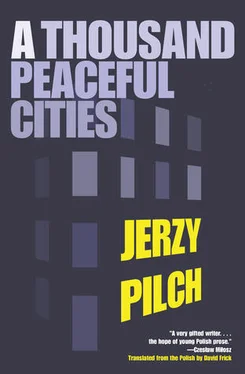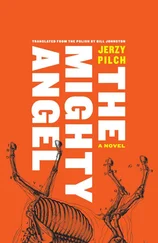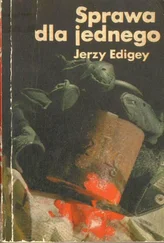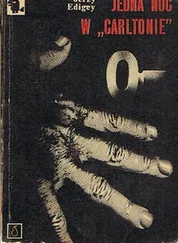“Permit me to propose a modest repast,” said Grand Master Swaczyna. He stood up from his place and moved in the direction of the vehicle, stopped for a moment, and, turning back in Station Master Ujejski’s direction, added: “A modest ecumenical repast.”
•
It was never like that again. White planets began to glide along the darkening horizon, stars were falling just behind our backs. The missionary musicians ascended the podium, and they began to play old Austrian marches and waltzes. Waiters in white coats with gold buttons carried chains of hunters’ sausage on silver platters. They placed before us bottles of Żywiec, Pilsner, and vodka, mustard in great jars, and home-baked bread on wicker trays. Four bonfires burned in the four cardinal directions. Light flowed through beer mugs and prewar chalices made of massive glass. The Pastor’s Wife pretended she didn’t see me. Elżunia Baptystka didn’t let me out of her sight.
“Elżunia,” I said to her, “I’m not in love with you.”
“Oh, love!” retorted Elżunia. “That doesn’t really happen.”
“It happened to me.”
“The blonde? The married woman who rented a room from Mrs. Rychter on the fifth floor? Little boys often think they’re in love with grown women, but even if it’s their first love, it usually isn’t true love.”
“This is true love. When I grow up, I’m going to marry her.”
“Jerzyk, first she would have to divorce her husband.”
“She will do it,” I said with absolutely charming certainty.
Elżunia giggled, but almost immediately her slightly asymmetrical features, ones that foretold incredible beauty, went into disarray. At that time, I didn’t yet know that speaking with a woman with whom you are not in love about another woman with whom you are in love is a deadly transgression, but I remembered the expression on Elżunia Baptystka’s face forever. It was not an expression of despair, or pain, or even of distaste. It was an expression of slowly mastered vulnerability. It was the look of the helpless woman who is trying to come to terms with male thoughtlessness, since there is nothing else to be done. Elżunia Baptystka got the better of my thoughtlessness and said:
“Before she divorces her husband for you, before you grow up, at least visit her. When you go to Warsaw in November with your father and Mr. Trąba to kill Gomułka, drop by and see her, while you have the opportunity.”
She looked me in the eyes and added:
“You’re very amorous, Jerzyk. Grow up as quickly as possible. Amorousness combined with erotic illiteracy is a deadly combination.”
I was certain that she would say something about the Pastor’s Wife just then. I was so irrefutably certain of it that I was feverishly working on a ruthless and brutal answer that would strike her to the quick, but Elżunia pointed to the edge of the glade and said:
“There they are, Jerzyk. They have returned, because they can’t live without you.”
As narrators of old used to say, I rubbed my eyes in amazement. At the edge of the forest, on the outskirts of the glade, on the border between radiance and darkness — there stood the morphinistes. They had lightened their hair and let it grow out. They were not wrestling with their Babylonian blanket. They had thrown broad men’s jackets made of quilted nylon over their shoulders. They were thus, especially to my unskilled eye, changed beyond recognition. But there they were.
“Yes, it’s them,” Elżunia Baptystka dispersed the shadows of my doubts, “it’s them, the morphinistes, otherwise known as Anka and Danka. Of course they aren’t morphine addicts. They are psychology students, and shortly they’ll begin to write their master’s theses. One of them will write about the psychology of a woman who is waiting for a man, and the other about the psychology of a man who is waiting for a woman. Run to them as fast as you can, my sweet lover boy.”
I had the irresistible urge to do so, but something beyond the sensory realm told me that if I set off in an ecstatic rush, I would make an utter fool of myself in front of Elżunia. I had all the greater urge for that mad, welcoming rush, since everyone had noticed them now, and everyone (strictly speaking — all the men) was already running in their direction. Even Father, even Father ran nimbly through the high, dark-blue grass. Or if he wasn’t running, he was walking with a very hurried step. Mother, the Pastor’s Wife, and Małgosia Snyperek stood up from their places and observed the welcoming ovations with gloomy faces, but I took Elżunia by the hand, and, with a dim presentiment that occupying the last place in the popular game of appearances wasn’t a bad thing, I said:
“Come on, Elżunia, let’s go greet them.”
She looked at me with a suddenly brightened gaze and whispered:
“Well, you learn quickly. That’s comforting.”
•
We embraced them, kneeled before them, squeezed their divine hands. They were beautiful. In their faces, slimmer now and flogged by Lutheran winds, there wasn’t a trace of the old defects. They were beautiful, but oddly abashed. They kept looking around, whispering something, exchanging knowing glances, behaving as if they were waiting for something or someone. And indeed, when, after a short while — so short that no form of their further being had had time to emerge after the chaotic greeting — male choral singing resounded in the nearby thickets, they smiled with obvious relief.
“Our boyfriends,” said one of them.
“Our Czech boyfriends are drawing near and singing,” added the other.
The singing became louder and louder, the words of the songs more and more distinct: “Yesterday I was at the dance, at the dance all day,” the invisible Czech boyfriends of the morphinistes sang, and when they became visible, it didn’t surprise any of us that there were five of them; five choristers, handsome as Czech hockey players, came out into the glade and sang: “My blue-eyed girl, I didn’t grind, I didn’t grind, the water took our mill;” then they sang “To a Circle, a Circle” and “Slavonice Polka.” They sang beautifully and sonorously in five beautiful and sonorous voices, and they didn’t interrupt their singing of the old Czech songs for even a moment. They sang “Beer Barrel Polka” and “Wedding Ring” and “Treacherous Hošíček.” We invited them to join us at the table. Grand Master Swaczyna delivered a welcome address that was filled with heartfelt internationalism, and the inspired singers, dressed in dark-green track suits, walked across the meadow and sang: “Shepherdess Annie, You Don’t Have a Fiddle at Home” and “My Charlie,” and they sat down at the table and sang “We Won’t Get Up in the Morning on Time” and “The Time has Long Passed.” And then they sang, “Where beer is brewed, there we prosper. Where beer is drunk, there we thrive. Let us go there and drink” until the foggy autumn dawn, and our unending dialogue about killing was conducted throughout that sweltering and holy night to the lively accompaniment of their singing. “I planted a convally, but a lily grew.”
•
Father Pastor Potraffke raised up his arms and said, or rather, shouting over the singing Czechs who were deaf to everything but their own song, he cried out:
“It was as it was, but one always somehow muddled through; but for us Protestants it was sometimes neither the one way nor the other. More precisely, it often is neither the one way or the other for us. On the one hand, in the twelfth chapter of the Epistle of St. Paul to the Romans, we find the pertinent commentary concerning absolute civic obedience toward the higher authority. On the other hand, it isn’t true that Protestants haven’t ever taken part in assassinations. .”
Читать дальше












